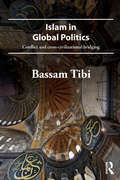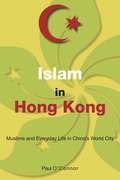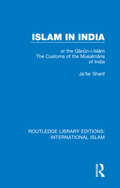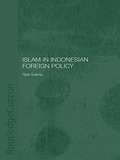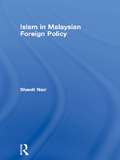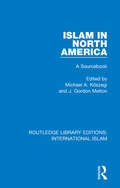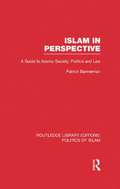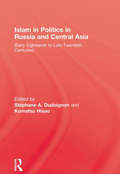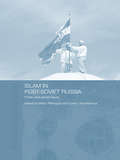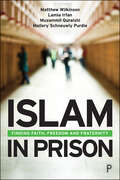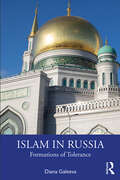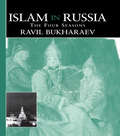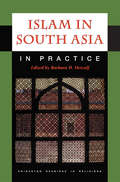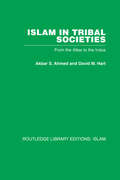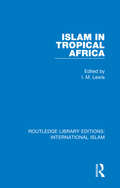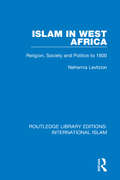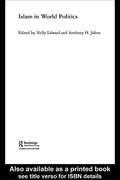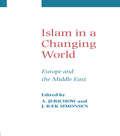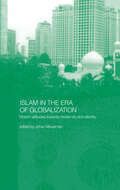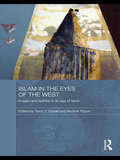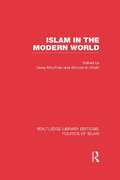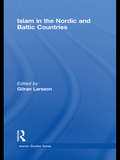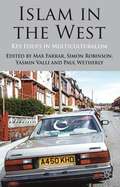- Table View
- List View
Islam in Global Politics: Conflict and Cross-Civilizational Bridging
by Bassam TibiReaching beyond traditionally politicised scholarship to provide a unique perspective on the place of religion and culture in global and local politics, this book examines the impact of Islam on 'civilizational' relations between different groups and polities. Bassam Tibi takes a highly original approach to the topic of religion in world politics, exploring the place of Islam in society and its frequent distortion in world politics to the more radical Islamism. Looking at how this becomes an immediate source of tension and conflict between the secular and the religious, Tibi rejects the 'clash of civilizations' theory and argues for the revival of Islamic humanism to help bridge the gap. Chapters expand on: inter-civilizational conflict in global politics dialogue between religious and secular, East and West western concepts of Islamism euro-Islam and the Islamic diaspora in Europe Islamic humanism as a tool for bridging civilizations. Shedding new light on the highly topical subject of Islam in politics and society, this book is an essential read for scholars and students of international politics, Islamic studies and conflict resolution.
Islam in Hong Kong
by Paul O'ConnorMore than a quarter of a million Muslims live and work in Hong Kong. Among them are descendants of families who have been in the city for generations, recent immigrants from around the world, and growing numbers of migrant workers. Islam in Hong Kong explores the lives of Muslims as ethnic and religious minorities in this unique post-colonial Chinese city. Drawing on interviews with Muslims of different origins, O'Connor builds a detailed picture of daily life through topical chapters on language, space, religious education, daily prayers, maintaining a halal diet in a Chinese environment, racism, and other subjects. Although the picture that emerges is complex and ambiguous, one striking conclusion is that Muslims in Hong Kong generally find acceptance as a community and do not consider themselves to be victimised because of their religion.
Islam in India: or the Qᾱnῡn-i-Islᾱm The Customs of the Musalmᾱns of India (Routledge Library Editions: International Islam #5)
by Ja'far SharifFirst published in 1832, this work was at the time considered an authoritative account of the beliefs and practices of the Musalmᾱns of India. This 1921 reprint includes an introduction from the editor, Dr William Crooke, which presents what is known about both Ja’far Sharif and the translator, G. A. Herklots. It also distinguishes the original material from the changes made by the translator and compares the book with other similar works published in the nineteenth-century. This book will be of interest to those studying the history of Islam, the history of ethnography and the British Empire.
Islam in Indonesian Foreign Policy: Domestic Weakness and the Dilemma of Dual Identity (Politics In Asia Ser.)
by Rizal SukmaThis companion volume to the highly successful Islam in Malaysian Foreign Policy explores the extent to which foreign policy in the world's largest Muslim nation has been influenced by Islamic considerations.
Islam in Liberalism
by Joseph A. MassadIn the popular imagination, Islam is often associated with words like oppression, totalitarianism, intolerance, cruelty, misogyny, and homophobia, while its presumed antonyms are Christianity, the West, liberalism, individualism, freedom, citizenship, and democracy. In the most alarmist views, the West's most cherished values--freedom, equality, and tolerance--are said to be endangered by Islam worldwide. Joseph Massad's Islam in Liberalism explores what Islam has become in today's world, with full attention to the multiplication of its meanings and interpretations. He seeks to understand how anxieties about tyranny, intolerance, misogyny, and homophobia, seen in the politics of the Middle East, are projected onto Islam itself. Massad shows that through this projection Europe emerges as democratic and tolerant, feminist, and pro-LGBT rights--or, in short, Islam-free. Massad documents the Christian and liberal idea that we should missionize democracy, women's rights, sexual rights, tolerance, equality, and even therapies to cure Muslims of their un-European, un-Christian, and illiberal ways. Along the way he sheds light on a variety of controversial topics, including the meanings of democracy--and the ideological assumption that Islam is not compatible with it while Christianity is--women in Islam, sexuality and sexual freedom, and the idea of Abrahamic religions valorizing an interfaith agenda. Islam in Liberalism is an unflinching critique of Western assumptions and of the liberalism that Europe and Euro-America blindly present as a type of salvation to an assumingly unenlightened Islam.
Islam in Malaysian Foreign Policy (Politics in Asia)
by Shanti NairA case study of a multi-ethnic Muslim state and a contribution to the study of the domestic functions of foreign policy. The book also addresses the real and imagined significance of Islam as a force in contemporary global politics.
Islam in Modern Thailand: Faith, Philanthropy and Politics (Routledge Contemporary Southeast Asia Series)
by Rajeswary Ampalavanar BrownThis book addresses the complexity of Islam in Thailand, by focusing on Islamic charities and institutions affiliated to the mosque. By extrapolating through Islam and the waqf (Islamic charity) in different regions of Thailand the diversity in races and institutions, it demonstrates the regional contrasts within Thai Islam. The book also underlines the importance of the internal histories of these separate spaces, and the processes by which institutions and ideologies become entrenched. It goes on to look at the socio economic transformation that is taking place within the context of trading networks through Islamic institutions and civil networks linked to mosques, madrasahs and regional power brokers. Brown casts this study of private Islamic welfare as strengthening rather than weakening relations with the secular Thai state. The current regime’s effectiveness in coopting these Muslim elites, including Lutfi and Wisoot, into state bureaucracies assists in widening their popular base in the south, in the north-east, and in Bangkok. Such appointments were efficacious in reinforcing the elite’s Islamic identity within a modern, secular, literate, and cosmopolitan Thai culture. In challenging existing studies of Thai Muslims as furtive protest minorities, this book diverts our attention to how Islamic philanthropy provides the logic and dynamism behind the creation of autonomous spaces for these independent groups, affording unusual insights into their economic, political and social histories.
Islam in North America: A Sourcebook (Routledge Library Editions: International Islam #2)
by Michael A. Kőszegi and J. Gordon MeltonFirst published in 1992, this book focuses on the Muslim community and how it has developed in North America. Divided into eight sections, it traces the history of the Muslim community in North America from the nineteenth century to the end of the twentieth-century and examines different aspects of the community such as Sectarian Movements, Islam in the African American community and points of contact between Christian and Islamic communities. The text includes a number of bibliographies to aid further study and closes with a helpful directory of Muslim organizations and centers in North America. This book will be of particular interest to those studying Islam and Religion in North America.
Islam in Perspective: A Guide to Islamic Society, Politics and Law (Routledge Library Editions: Politics of Islam)
by Patrick BannermanThere has been a significant upsurge of western interest in the political manifestations and significance of Islam in the last decade, fuelled by the notion of Islamic ‘revival’, the Iranian revolution and by events in countries as diverse as Egypt, Pakistan and Sudan. Oil power and its effect on the international economic order, the relationship of Muslim countries with the superpowers and the continuation of the Arab-Israeli conflict have also served to focus attention on Islamic politics and, in particular, on the notion of Islamic reassertion. As the author of this book argues, one result of this interest has been the development of a view of Islam as monolithic and implacable. He takes a broad view of the intellectual and cultural history of Islam, emphasising the extraordinary diversity of Islamic societies and the ways in which the ideal is often pragmatically adapted to reality. In this wider social and historical context, the nature of Islamic revival is then reassessed. First published in 1988.
Islam in Politics in Russia and Central Asia: Early Eighteenth to Late Twentieth Centuries
by Komatsu Hisao Stephane A. DudolgnonFirst Published in 2001. This volume contains the proceedings of the international colloquium held by the IAS Project in October 1999. These papers deal with the modem and contemporary history of Central Eurasia, for a comprehensive reflection on various phenomena that led to a political valuation of Islam under non-Muslim domination, whether Russian or Chinese, since the beginning of the 18th century. A comparative approach to the current situations in the Russian Federation and the newly independent states of Central Asia has allowed us to study the various modes of the political instrumentalization of Islam, by both political power and opposition, in such various areas as the Ferghana Valley in Uzbekistan and the Volga-Urals region of Russia.
Islam in Post-Soviet Russia: Public And Private Faces
by Hilary Pilkington Galina YemelianovaThis book, based on extensive original research in the field, analyses the political, social and cultural implications of the rise of Islam in post-Soviet Russia. Examining in particular the situation in Tatarstan and Dagestan, where there are large Muslim populations, the authors chart the long history of Muslim and orthodox Christian co-existence in Russia, discuss recent moves towards greater autonomy and the assertion of ethnic-religious identities which underlie such moves, and consider the actual practice of Islam at the local level, showing the differences between "official" and "unofficial" Islam, how ceremonies and rituals are actually observed (or not), how Islam is transmitted from one generation to the next, the role of Islamic thought, including that of radical sects, and Islamic views of men and women's different roles. Overall, the book demonstrates how far Islam in Russia has been extensively influenced by the Soviet and Russian multi-ethnic context.
Islam in Prison: Finding Faith, Freedom and Fraternity
by Matthew Wilkinson Muzammil Quraishi Lamia Irfan Mallory Schneuwly PurdieAre you a prison officer who feels nervous about dealing with Muslims on the wings? Are you a prison chaplain who wants to know how your chaplaincy affects the lives of prisoners? Are you a policymaker who needs a robust base of evidence for Islam in prison? Are you an academic or a journalist seeking ground-breaking social science in a contentious field? Based on original evidence from 279 Muslim prisoners and 79 prison officers, we explore how Muslims come to be incarcerated, how the practice of Islam affects prison life and rehabilitation, the types of Islam and the effects of Islamic conversion in prison and the professional practice of officers and chaplains. We also investigate the common belief that incarceration fosters Islamist extremism and suggest improvements to faith provision and rehabilitative opportunities for Muslim prisoners.
Islam in Russia: Formations of Tolerance
by Diana GaleevaIslam in Russia is a rare scholarly attempt to understand the tolerant nature of Islam in the modern Russian Federation since the state’s official acceptance of Islam.The book explores the key factors that have contributed, over time, to the establishment of a co-existent form of Islam in modern multi-ethnic and multinational Russia. It also probes discussion of the role that Russian Muslim intellectuals have played in forming contemporary Russian Islam. It concludes that the co-existent form of Islam in Russia can be linked to three key factors: its historical emergence, the intellectual culture, and strong regional identities.This original and engaging examination of the development and identity of Islam in Russia is a useful resource for students and scholars of Global Islam, Islam in Europe, History of Russia, Islamic History, Islamic Thought and Modern Religious History.
Islam in Russia: The Four Seasons
by Ravil BukharaevA fascinating story of spiritual survival. The cultural and national reawakening that has accompanied the resurgence of Islam in Russia has contributed to the revival and renewal of Islamic thought throughout the Muslim world. The author explores how Islam vis-a-vis Russian Orthodox Christianity shaped national, political and cultural developments in the vast region of European Russia and Siberia. This volume thus presents an analysis of the history, development and future prospects for Islam in Russia based on exhaustive research of the primary and secondary sources as well as the author's own personal experience.
Islam in South Asia in Practice (Princeton Readings in Religions #33)
by Barbara D. MetcalfThis volume of Princeton Readings in Religions brings together the work of more than thirty scholars of Islam and Muslim societies in South Asia to create a rich anthology of primary texts that contributes to a new appreciation of the lived religious and cultural experiences of the world's largest population of Muslims. The thirty-four selections--translated from Arabic, Persian, Urdu, Bengali, Tamil, Gujarati, Hindavi, Dakhani, and other languages--highlight a wide variety of genres, many rarely found in standard accounts of Islamic practice, from oral narratives to elite guidance manuals, from devotional songs to secular judicial decisions arbitrating Islamic law, and from political posters to a discussion among college women affiliated with an "Islamist" organization. Drawn from premodern texts, modern pamphlets, government and organizational archives, new media, and contemporary fieldwork, the selections reflect the rich diversity of Islamic belief and practice in South Asia. Each reading is introduced with a brief contextual note from its scholar-translator, and Barbara Metcalf introduces the whole volume with a substantial historical overview.
Islam in Tribal Societies: From the Atlas to the Indus
by Akbar S. Ahmed David M. HartA lively debate is currently being conducted in the social sciences around the concepts of "tribe", "segmentary societies" and "Islam in society". This wide-ranging collection by thirteen distinguished anthropologists contributes to the debate by examining various segmentary Islamic tribal societies from Morocco to Pakistan.
Islam in Tropical Africa (Routledge Library Editions: International Islam #4)
by I. M. LewisFirst published in 1980, this second edition of Islam in Tropical Africa presents specialist studies of the history and sociology of Muslim communities in Africa south of the Sahara. The studies cover an extensive and range of time and place, and include consideration of particular aspects of Muslim belief and practice in regions such as Senegal and Somalia. The second edition includes an updated introduction which draws attention to the ways in which differently organized traditional cultures and social systems had reacted and adapted to Muslim influence in the field of politics, law and ritual in the second half of the twentieth century. This book will be of interest to those studying Islam, African studies and ethnography.
Islam in West Africa: Religion, Society and Politics to 1800 (Routledge Library Editions: International Islam #3)
by Nehemia LevtzionFirst published in 1994, this volume brings together essays from the celebrated scholar of African history, Nehemia Levtzion. The articles cover a wide range of themes including Islamization, Islam in politics, Islamic revolutions and the work of the historian in studying this field. This collection is a rich source of supplementary material to Professor Levtzion’s major publications on Islam in West Africa. This book will be of key interest to those studying Islamic and West African history.
Islam in World Politics (Routledgecurzon Advances In Middle East And Islamic Studies)
by Nelly Lahoud Anthony H. JohnsThe essays in this collection examine the emergence of Islam as a force in today’s international political arena. Driven by a concern to understand factors leading to, and the implications of, this heightened political profile the contributors go beyond polemics and apologetics. The book critically examines some of the major events, movements and trends in the Islamic world over the past fifty years and their impact on the international scene. Reflecting the diversity and heterogeneity of the Muslim world, the book covers issues including: the challenge of Islamism to the Muslim world the use of Islam as a political tool on the international scene Islam’s contribution to the theory and practice of global finance Islam’s role in gender discourse Islam’s articulations in the Indian Sub-continent, Southeast Asia, Central Asia and the Arab world. Very little of the current literature deals with political Islam globally, and very few books go much beyond the Middle East and its terrorist groups. This volume fills that gap, providing a compelling cross-national, cross-cultural and interdisciplinary analysis of Islam as a potent political force.
Islam in a Changing World
by Anders Jerichow J. B. SimonsenPapers from a conference held in Copenhagen in 1996 on the compatibility between Islam and universal norms and values, and the perspectives for dialogue and mutual understanding.
Islam in the Era of Globalization: Muslim Attitudes towards Modernity and Identity (Routledgecurzon Studies In Asian Religion #No.6)
by Johan MeulemanGlobalization, modernity and identity are fundamental issues in contemporary Islam and Islamic Studies. This collection of essays reflects the wide diversity that characterises contemporary Islamic Studies. The case studies cover regions stretching from China and Southeast Asia to diaspora communities in the Caribbean and Tajikistan. There is significant participation of intellectual voices from all areas concerned, providing a real contribution to the academic exchange between the Muslim and the Euro-American worlds.
Islam in the Eyes of the West: Images and Realities in an Age of Terror (Durham Modern Middle East and Islamic World Series)
by Tareq Y. IsmaelFrom the terrorist attacks of September 11, 2001 in New York to the Madrid and London bombings of 2004 and 2005, the presence of Muslim communities in the West has generated security issues and major political concern. The government, the media, and the general public have raised questions regarding potential links between Western Muslims, radical Islam and terrorism. This speculation has given rise to popular myths concerning the Islamic world and led to a host of illiberal measures such as illegal warranting, denial of Habeas Corpus, "black prisons" and extreme torture throughout the democratic world. This book challenges the authenticity of these myths and examines the ways in which they have been used to provide an ideological cover for the "war on terror" and the subsequent Iraq war. It argues that they are not only unfounded and hollow, but have also served a dangerous purpose, namely war-mongering and the empowering of the national-security state. It further considers the origin and transmission of these myths, focusing on media, government policy and popular discourse.
Islam in the Modern World (Routledge Library Editions: Politics of Islam)
by Denis Maceoin Ahmed Al-ShahiIn recent years, events in the Islamic world have captured the attention of the West to an unprecedented degree. However, much of the media coverage of events like the Islamic revolution in Iran has merely reinforced current prejudices and misconceptions about Islam. This collection of essays, by specialists in a variety of disciplines, gives an impressionistic overview of contemporary Islam. Different areas of Islamic life are singled out for special attention; these include the problem of relations between Islam and the West, the role of the Sufi orders and the revival of religious fundamentalism, Islam and the feminine, Islamic economics and Islamic architecture. Geographically, the essays cover a wide area, ranging over Sudan, Turkey, Iran, Egypt and Saudi Arabia. Each discussion should appeal to the layman and specialist alike and collectively they bring together a comprehensive range of material not often covered in one volume. Above all, they cut across the stereotypes of Islam found in the popular media, to reveal facets of a complex, living tradition often unsuspected in the West. First published in 1983.
Islam in the Nordic and Baltic Countries (Routledge Islamic Studies Series)
by Göran LarssonAlthough Muslims are now an important presence in Europe, little is known about the Muslim communities that exist in the Nordic and Baltic regions of Europe. This is the first comprehensive and detailed study of the history, context and development of Islamic institutions and Muslim groups in Sweden, Norway, Denmark and Finland, and includes chapters on Islam in Estonia, Latvia, Lithuania, Iceland and the Faroe Islands. With contributions by academics with long experience of the Muslim communities in question based on original research, this volume presents new and important perspectives within a comparative and regional framework. Islam in Nordic and Baltic Countries will be an important reference work for students of European history and Islamology, and will be valuable to all researchers and scholars interested in the development of Islam and Muslim communities at the strategic heart of Northern Europe.
Islam in the West
by Simon Robinson Max Farrar Yasmin Valli Paul WetherlyThis book contributes to understanding of the contemporary relationship between Muslims and the Western societies in which they live, focusing particularly on the UK. Chapters reflect on the nature of multiculturalism, as well as a wide range of specific aspects of daily life, including religious dialogue, gender, freedom of speech and politics.
